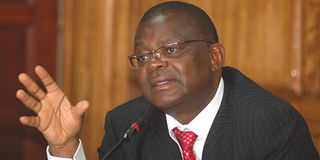Breaking News: At least 10 feared to have drowned in Makueni river
Counties face Sh133bn budget crisis, MPs warn

The report comes just days after Finance Minister Njeru Githae introduced new taxes in changes to the Finance Bill to raise Sh40 billion to pay teachers and doctors. Photo/FILE
What you need to know:
- House Budget Office paints a bleak financial reality of devolved units - all are too poor to raise the money needed to provide services. The poorest, Tana River, needs 70 times more than it can raise and Nairobi, the richest, has only half what it needs Story on Page 4
- Devolved units can only raise Sh17 billion, far below the Sh150 billion target
- The transitional clauses in Constitution direct that county governments only take effect when their sustainability is guaranteed
A new parliamentary report has exposed massive poverty in the counties, which requires a cash injection of Sh133 billion next year to help plug their budgetary deficits, if they are to function adequately.
All the 47 counties can only raise Sh17 billion in revenue every year, far below the Sh150 billion needed to fund them, according to the Budget Watch report dated September 25.
The statistics are likely to pour cold water on the government’s promise that the functions of the counties, as set out in the Constitution, will be devolved soon after the March 4 General Election. (READ: MPs raise the alarm over county plans)
The transitional clauses in Constitution direct that county governments only take effect when their sustainability is guaranteed.
While governors and County Assembly members will be picked in the coming elections, not all the functions set out in the Fourth Schedule of the Constitution will be the forte of the county governments.
Besides, the law is clear that functions of county governments must be “devolved promptly to counties that have the capacity to perform them but that no county is given functions it cannot perform”.
The release of the report by the Parliamentary Budget Office comes at a time the country is seeking more funds to ensure that the implementation of the Constitution stays on course. It portends an increase in taxes at the counties to ensure they raise enough money for their activities.
The Budget Office notes in the report: “Increased spending associated with constitutional reforms and devolution; election uncertainties and the possibility of drought in the early part of the year 2013 will just add on to the hard budget constraint.”
The report comes just days after Finance Minister Njeru Githae introduced new taxes in changes to the Finance Bill to raise Sh40 billion to pay teachers and doctors.
The Budget Office consists of a team of technocrats based in Parliament that advises MPs on economic issues.
The House mandarins also noted that the country’s growth prospects were likely to dim because of the volatile oil prices, retaliatory terror attacks by the Somalia-based Al-Shabaab group and the “crisis in the Euro Zone which could affect Kenya’s exports and hurt export earnings”.
Growth prospects
According to the report, the richest county, Nairobi, can only raise half the amount it needs to deliver services. But the poorest, Tana River, will need 70 times more of its revenue potential.
Each county needs between two and 70 times its current revenue potential to be sustainable, according to the report. Of the estimated Sh17 billion revenue potential from all the counties, Nairobi has the largest revenue capacity of Sh6.9 billion.
Though it is the administrative, economic and investment hub in the region, and home to the national government headquarters, that amount is not enough to run the city that will need Sh12.8 billion to deliver services to three million residents.
The report ranks Mombasa as the county with the second largest revenue potential. The coastal town’s revenue stands at Sh1.4 billion but it will need Sh4.7 billion to run optimally. Kakamega County, which is the most populous, can only marshal Sh238 million in revenue, yet the costing of services shows it will need 20 times that amount — Sh4.9 billion.
While Nairobi will get the lion’s share of the amount from the national public coffers, Tharaka-Nithi with a revenue potential of Sh47.6 million annually will get the lowest amount of Sh1.3 billion to deliver services.
Tana River County, which was recently rocked with clashes, is the poorest county with a potential of raising a measly Sh25.5 million in taxes every year. It will need Sh1.8 billion to ensure access to key services.




